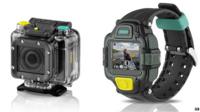

-
9 June 2015
- From the section Technology

The British mobile phone network EE is to sell its own action cameras with built-in 4G.
The feature means the devices can stream footage to the internet with up to 720p high-definition resolution.
Users will need to pay EE for the required 4G connectivity.
Models sold by the sector’s bestselling brand, GoPro, do not offer internet broadcasting as standard, although there are add-on apps and kit that make it possible.
The mobile network said that its 4GEE Action Cam was the first in a range of own-brand connected devices that it planned to release this year.
“We understand our customers not only want superfast coverage, they want products that give them the very best experiences, coupled with the most innovative and exciting ways in which to share them,” said EE chief executive Olaf Swantee.
One industry watcher said the camera should appeal to a young audience accustomed to being able to “instantly share” self-generated videos and photos, but added that it was probably not destined to become a bestseller.
“This is basically a niche product,” said Francisco Jeronimo, from research company IDC.
“But EE’s goal is not to dominate the action-cameras segment, it’s to make users aware they can share moments straight away with friends if they have a connection.
“It will be very happy if in a year’s time it doesn’t have to make the hardware itself because GoPro has started to provide an action camera of its own with a Sim card.

“What EE’s doing is very similar to what operators did with own-branded 3G and 4G handsets when the networks first launched and there were not devices affordable enough for most users.”
Standalone streams
GoPro’s filings state that it shipped 5.2 million action cameras in 2014, an increase of 35% on the previous year.
GoPro dominates the action-camera market, despite attempts by other tech companies, including Garmin, Xiaomi, HTC and TomTom to sell rival products designed for use during adventure sports and other activities.
GoPro’s cameras can be used to broadcast live footage, but this requires them to be wirelessly linked to a smartphone running Livestream’s third-party app or plugged into the HeroCast transmitter, which costs $7,500 (£5,000) and is targeted at professional broadcasters.
By contrast, the 4GEE Action Cam can broadcast video without the need for separate equipment, using a new streaming service called Skeegle.
One advantages of Skeegle is that it restricts access to a user’s broadcasts to specific contacts.
But the downside is that unless the camera owner already subscribes to an EE “shared plan”, they will face a bigger mobile data bill.
Another issue is that EE’s camera does not feature a built-in rear screen. Instead it lets users frame their shots via a “viewfinder wristwatch”, which it comes packaged with, that also allows owners to start and stop recordings with a button press.
The 4GEE Action Cam is also limited to saving footage in 1080p HD resolution and streaming it in 720p.
By contrast, GoPro’s Hero4 family of products can record video at up to 4K ultra-high definition, which can be useful if the owner wants to zoom into and crop their footage after it has been recorded. GoPro’s kit also benefits from a wider range of add-on accessories.
The 4GEE Action Cam will, however, benefit from being given prominence in EE’s network of stores when it goes on sale next week.

